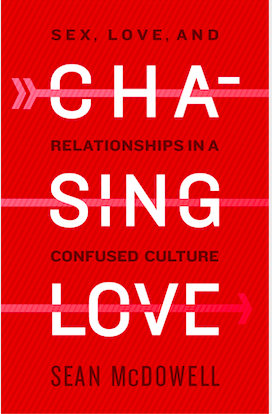SeanMcDowell.org
Has the sexual purity movement in the church been a success, or has it been a failure? There has been a ton of books, articles, and even documentaries made about this question and it has been a significant part of the cultural conversation for the past few years.
I have read (or watched) almost everything on this conversation. Why? In just a few weeks, I am releasing my latest book: Chasing Love: Sex, Love, and Relationships in a Confused World. The book and curriculum are the latest incarnation of the True Love Waits Campaign.
As I have studied discussions on the purity movement, as well as Scripture, it seems that three key ideas ought to characterize sexual purity messages today.
First, Emphasize trusting the character of God. Gen Zers have more messages incessantly bombarding them than any previous generation. Music. Movies. Social Media. Netflix. Endless voices are persistently speaking messages into the lives of young people about sex, love, and relationships. Thus, a pressing question is, who will they trust?
Some earlier sexual purity campaigns emphasized the fear of STDs or the positive benefits of following biblical sex. These points ought to be raised and discussed, but the heart of why a young person should aim to follow biblical teachings on sex and love is because God is trustworthy and knows what is best for him or her. There is going to come a point when young people must decide if they trust God even when His commands don’t make sense.
Why is the character of God so important? Here's my response (for students) in Chasing Love:
“How you understand the character of God shapes how you evaluate His commands. If you don’t truly believe God is good, you’ll tend to view His commands as oppressive and controlling. You’ll be tempted to consider God a “cosmic killjoy,” intent upon stealing your fun. On the other hand, believing God is good sets you free to trust Him and His plan as the best path to both giving and receiving genuine love.”
Second, Learn to love with the body and soul. Scripture teaches that we are to love God with our bodies (1 Cor. 6:19-20) and our souls (Rom. 12:2). Yet sometimes in the Protestant church we have emphasized loving God merely with our minds at the expense of what it means to love God–and others–with our bodies.
The reality is that we communicate with both our souls and our bodies. Consider a used-car salesman who sells you a car while withholding a problem with the transmission, and then shakes your hand. Did he lie with his body? Absolutely. Bodily acts carry inherent meaning.
Here is how I sum it up in Chasing Love:
“Sex means something. Physical touch means something. Humans are body and soul. We are thus confronted with a pressing question: How do we honor God and love other people with our bodies and our souls?”
Third, Highlight the beauty and goodness of singleness. Earlier sexual purity campaigns often considered singleness a temporary waiting place for the “real” thing of marriage. This overemphasizes the importance of marriage and underemphasizes the goodness and beauty of singleness. Both Jesus and Paul consider marriage and singleness powerful ways of serving God (Matt 19; 1 Cor 7).
Here is how I sum it up in Chasing Love:
“Singleness and marriage are equal ways of serving the Lord. Both offer unique blessings, and both have unique challenges. Whether single or married, we are each called to find our identity in Christ and to use our marital status in service to the Lord. Remember, our lives are not ours. We tend to approach life with the goal of getting those most out of it that we can. But if we focus on living for Him, then we don’t have to worry about “missing out” on the things of this world.”
I plan to write much more on the new sexual purity movement in coming weeks. For now, if you pre-order the book, we will send you two special interviews with Richard Ross, the founder of True Love Waits and Josh McDowell, the architect of the Why Wait? campaign (Yes, he's my dad!). Ross and McDowell offer perspectives on how the conversation has changed over the past few decades and provide some insights for parents, pastors, teachers, and others who care about young people today: https://www.bhpublishinggroup.com/chasinglove/.


